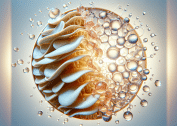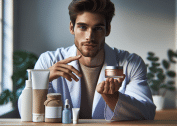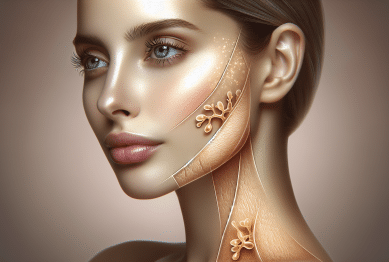Explore how hydration goes far beyond drinking water for radiant, healthy skin. This guide covers the connection between hydration habits and beauty routines, highlighting strategies that many overlook—yet they might make all the difference for a glowing complexion and overall wellness.
Understanding the Link Between Hydration and Skin Health
Hydration plays a vital role in maintaining supple, vibrant skin, but many overlook this foundational aspect of beauty routines. Skin, as the body’s largest organ, requires consistent hydration both from within and outwardly to perform its protective and regenerative functions. Incorporating hydration into a daily routine doesn’t just mean drinking more water—it starts with understanding why moisture matters and how the skin barrier works. When the skin lacks proper moisture, it struggles to repair itself and retain elasticity. This makes it more prone to irritation, tightness, and breakouts, underscoring the importance of a wellness and beauty approach that prioritizes hydration at every level.
Hydration isn’t only about quenching thirst; it supports skin’s resilience by helping maintain a healthy barrier against pollutants and irritants. Integrating moisturizing products, monitoring environmental humidity, and adjusting habits can each create a supportive environment for hydrated skin. Balanced hydration assists cell turnover and helps to keep skin smooth, lessening the likelihood of dry patches or rough texture. Learning which hydrators work in sync with your natural oils can significantly boost your wellness and beauty regimen.
The impact of hydration extends to those who may spend hours in air conditioning, travel often, or exercise intensely. These factors contribute to the loss of skin moisture and can quietly undermine efforts at achieving radiant skin. Even foods with high water content, such as cucumbers or watermelon, can contribute to overall hydration and the appearance of a natural glow. Adopting mindful hydration habits, in combination with a balanced diet and a gentle skincare routine, supports not just appearance but total skin health over time. Many discover that these habits lead to greater comfort and self-confidence, making skin care feel more effective and enjoyable.
Hidden Sources of Dehydration and Their Effects
Some hidden aspects of daily life can quietly sabotage hydration efforts and, as a result, impact beauty goals without being immediately obvious. Common culprits include excessive caffeine intake, alcohol consumption, and high-sugar diets. These habits act as diuretics or increase water loss, triggering skin to respond with dryness, flakiness, or even an overproduction of oil as a form of compensation. Individuals who overlook these factors might find themselves frustrated by the lack of results from their normal skincare rituals, not realizing that behavioral tweaks could help restore balance.
Environmental variables are another under-recognized factor in hydration management. High-altitude settings, frequent flights, and polluted urban environments can all increase the rate at which moisture escapes from the skin. Using humidifiers at home or hydrating facial mists mid-day can offer surprising relief, especially for those whose lifestyles involve regular exposure to these draining environments. The same applies to hot showers or over-cleansing, which can strip natural oils and diminish the moisture barrier even when the intention is cleanliness or relaxation.
For those seeking wellness and beauty upgrades, keeping a hydration journal or using technology like reminders on fitness trackers can make a noticeable difference. Simply becoming aware of less obvious hydration pitfalls empowers better choices. Over time, many find their skin appears smoother, less irritated, and better able to withstand daily stressors—proof that even subtle adjustments can have meaningful, visible outcomes for both confidence and comfort.
Integrative Approaches: Nutrition and Topical Care for Hydrated Skin
Skin thrives when addressed holistically—meaning nutrition and topical care must work in harmony for true hydration. Eating a wide range of fruits and vegetables, rich in antioxidants and water, supports the skin’s natural repair systems. Fatty acids found in seeds, nuts, and fish also contribute to maintaining the skin barrier and locking in moisture. When these nutritional elements are paired with topical moisturizers containing humectants and emollients, skin can stay softer and brighter for longer.
Certain skincare routines amplify hydration benefits, particularly when layered correctly. Begin with gentle cleansing to remove impurities, followed by a toner or essence that primes skin for deeper moisture. Serums containing hyaluronic acid pull water into the superficial layers, while a final layer of cream or oil can help prevent evaporative loss. This cocktail of products shouldn’t overwhelm the skin; rather, the process can be tailored to suit unique needs—making wellness and beauty personal and flexible.
Emerging research points toward adaptogens and supplements as supportive to skin hydration, especially for those with ongoing dryness concerns. These ingredients, found in products sourced from reputable organizations, offer a way to boost the skin barrier from within. However, experts encourage consulting with dermatologists or registered dietitians before introducing new supplements. Combining internal and topical strategies, while allowing space for professional advice, creates a well-rounded approach that adapts as individual skin needs evolve.
Lifestyle Strategies for Long-term Hydration and Glow
Long-term beauty is supported by ritual, not just occasional treatments. Building practical routines—such as drinking small amounts of water throughout the day, protecting skin from environmental stressors, and selecting clothing that minimizes friction—adds up over time. The impact of sleep on skin hydration is another critical but often overlooked factor; repairing occurs most efficiently at night, when cells regenerate and the moisture barrier recovers from daily stress.
Movement, such as moderate exercise, encourages circulation and assists in the delivery of hydrating nutrients throughout the entire body. Outdoor activities offer the dual benefit of exposure to fresh air, though it remains important to guard against sun damage with broad-spectrum sunscreen. Attention to pre- and post-exercise skincare—using lightweight, non-comedogenic products—helps control sweat-related water loss and keeps the complexion balanced.
Mindfulness and meditation can also play a subtle role by counteracting the physical effects of stress, which is known to exacerbate dryness and dullness. Many find that adopting thoughtful routines not only improves hydration status, but also fosters overall well-being. Keeping the focus on prevention, rather than correction, sets the stage for lasting radiance and wellness—a benefit that extends far beyond the bathroom mirror.
Tools, Trends, and Myths Around Hydration in Beauty
A surge in beauty tech and wellness devices has made tracking and supporting hydration more accessible. Smart water bottles, humidity sensors, and skin analysis apps help users spot dehydration early and adjust their routines in real time. However, it’s wise to remain skeptical of trends that promise dramatic improvements without substantial clinical evidence. Separating evidence-based methods from marketing hype empowers informed decision-making for sustainable skin care habits.
Certain myths persist—such as the idea that simply drinking eight glasses of water is a cure-all for dryness. While water intake is undeniably important, skin hydration involves a more complex interplay of internal balance, barrier function, and the effects of one’s surroundings. When individuals broaden their understanding, they become better equipped to navigate the flood of advice and focus on personalized, effective solutions for their unique skin concerns.
Collaborating with licensed skincare professionals can clarify which tools and treatments align with individual goals. Exploring medical-grade moisturizing options or pursuing guided facials might be worthwhile for persistent dehydration. By combining data-driven assessments with gentle, science-backed interventions, many unlock pathways to realize the glowing, hydrated skin they aim for—without falling for the latest short-lived trend.
Hydration Habits for Every Season
Changing seasons introduce new hydration challenges and opportunities. Hot, humid summers increase perspiration and can leave skin feeling greasy, yet prolonged exposure to the sun and air conditioning may actually dehydrate. In winter, cooler temperatures and dry indoor heat contribute to flaking and itching. Adjusting beauty and wellness routines with the calendar—such as switching to richer creams or shorter, lukewarm showers—helps maintain moisture balance year-round.
Layering hydration is especially valuable during times of seasonal transition. This means pairing a lightweight serum with an occlusive moisturizer or incorporating weekly hydrating masks to combat sudden shifts in temperature and humidity. Many find benefit in paying attention to fabric choices—favoring hypoallergenic, breathable materials—during months when skin is prone to chafing or irritation, further supporting overall comfort and protection.
Seasonally inspired nutrition also plays a supporting role. Enjoying watermelon and berries in summer, or root vegetables and healthy fats in winter, reinforces both hydration status and total body wellness. Those who pay ongoing attention to how their skin responds across the year can more effectively adapt and enjoy the year-round benefits of thoughtful hydration as a core part of self-care.
References
1. Harvard Health Publishing. (n.d.). The importance of hydration for healthy skin. Retrieved from https://www.health.harvard.edu/staying-healthy/how-much-water-should-you-drink
2. American Academy of Dermatology Association. (n.d.). Tips for healthy skin. Retrieved from https://www.aad.org/public/everyday-care/skin-care-secrets/routine/healthy-skin
3. Cleveland Clinic. (n.d.). Hydration and your skin. Retrieved from https://health.clevelandclinic.org/hydration-and-your-skin/
4. National Institutes of Health. (n.d.). Nutrition and skin health. Retrieved from https://www.ncbi.nlm.nih.gov/pmc/articles/PMC3583891/
5. Skin Cancer Foundation. (n.d.). Understanding skin’s barrier function. Retrieved from https://www.skincancer.org/skin-cancer-information/skin-and-sun-exposure/
6. Mayo Clinic. (n.d.). Healthy lifestyle: Adult health. Retrieved from https://www.mayoclinic.org/healthy-lifestyle/adult-health/in-depth/water/art-20044256









